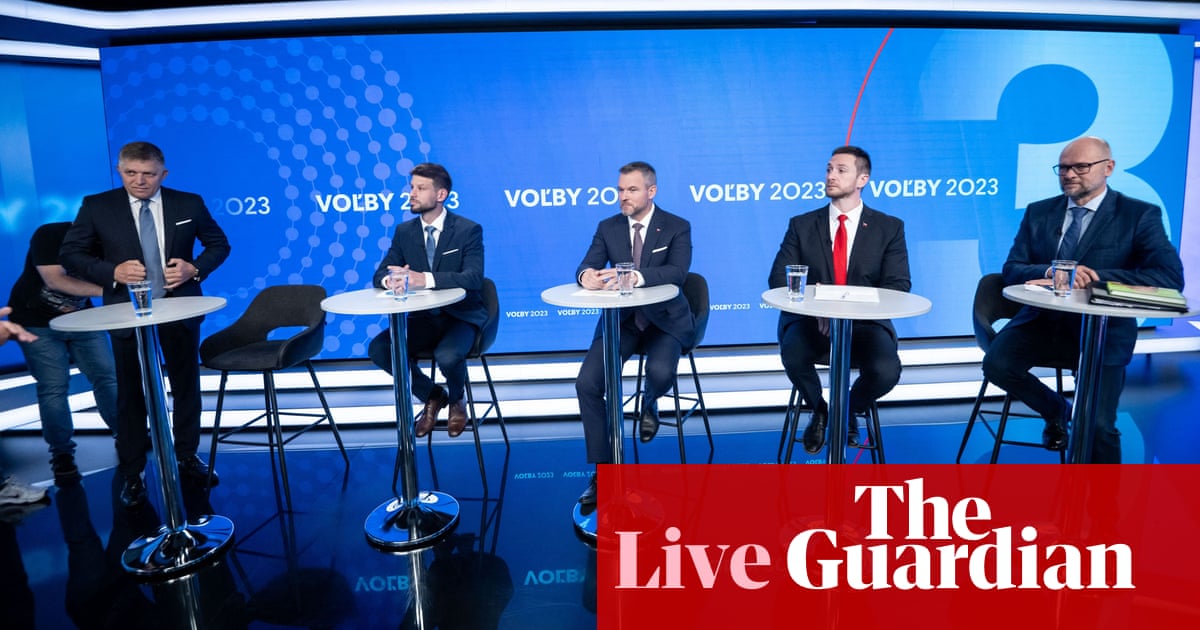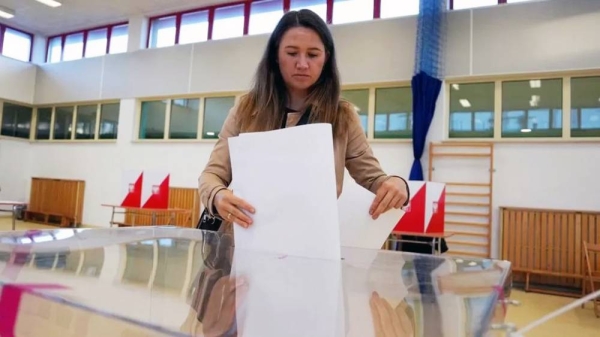
Poland’s tightly fought and intensely polarising presidential election has gone down to the wire, as a late poll on Sunday night showed the incumbent, Andrzej Duda, leading his liberal challenger, Rafał Trzaskowski, by less than two percentage points on 50.8% to 49.2%.
The figures, released around midnight in Warsaw, were based on a wide-ranging exit poll adjusted to take into account the first few available results. They were within the poll’s margin of error of 2%, meaning the outcome was still up in the air in the early hours of Monday. However, Duda had improved slightly on the results of the exit poll alone, which had given him 50.4%.
Both candidates gave speeches on Sunday evening suggesting they were confident of victory. A further late poll is due overnight, but the result could be so close that it may be Monday afternoon or even Tuesday before the final outcome is known.
“All the votes just need to be counted which, in truth, will make this evening a nerve-wracking one for everyone in Poland,” said Trzaskowski, the mayor of Warsaw, to supporters on Sunday evening. “But I am absolutely convinced that when we count each vote, we will be victorious and we will definitely win.”
The result is seen as crucial for the future direction of Poland and its relations with the rest of Europe. Duda is allied to the ruling Law and Justice party (PiS), and a win for him would give PiS control of most of the levers of power for several more years, allowing it to continue an agenda that has eroded the rule of law and judicial independence, putting Poland on a collision course with the EU.
If Trzaskowski wins, he will be able to use the presidential veto to stymie the PiS legislative agenda, and will portray a more liberal and pro-EU face of Poland to the outside world. Analysts said that if the final result is as close as expected, there could lengthy and acrimonious challenges.
“This situation favours Andrzej Duda: not just because he’s slightly in the lead, but also because most of the country’s institutions have, over the past five years, become highly politicised and subordinated to the ruling party. This includes the supreme court, which is the one that will announce the final result of the election,” said Piotr Buras and Pawel Zerka, of the European Council on Foreign Relations, in a statement.
Duda and Trzaskowski, both 48, emerged from a first-round field of 11 candidates, all of them male. Duda won 43.5% of the first vote while Trzaskowski got 30.5%, but most polls suggested the runoff would be a very close call.
Turnout was nearly 69% as polls closed, and was possibly heading for a record figure. It was up more from the first round in smaller towns, which have traditionally favoured Duda, but there were also more than half a million voters who had registered to vote abroad, a record number. These included 180,000 in the UK, where voters scrambled to return postal ballots on time as in-person voting was not allowed.
Trzaskowski won more than twice as many votes from abroad as Duda in the first round a fortnight ago.
Trzaskowski has claimed this is the last chance to reverse the democratic backsliding that has taken place during the last five years of PiS government. “It’s now or never,” he said last week. Either the ruling party would “continue to destroy independent institutions, further try to politicise courts, destroy local governments and threaten the freedom of the media, or we will have a democratic state where the president restores the balance,” he said.
The PiS leader, Jarosław Kaczyński, also portrayed the election as “a battle for the future of Poland”, reprising a theme that has played out in government media outlets suggesting that Trzaskowski is beholden to shadowy foreign interests.
Duda has portrayed himself as a president who has improved the country’s economy over the past five years, but he has also pledged to defend “family values” at the expense of LGBT rights. His campaign has been laced with homophobic rhetoric, as he turned the fight against so-called “LGBT ideology” into one of his main talking points.
This combination of rightwing social and cultural policies with increased state disbursal of money has proved a winning combination for PiS in small towns and villages in recent years.
Many progressive voters voiced fears for their own futures were Duda to be re-elected. “I voted for Trzaskowski out of political conviction,” said Aleksandra, a 30-year-old voter in Piaseczno, a satellite town to the south of Warsaw. “I want equality, I don’t want to feel like some people are worse than others. I will see what the result is but I have already been considering leaving the country and maybe after this election I will go.”
The election was meant to take place in May, when Duda was riding high in the polls and was expected to win easily. However, with coronavirus restrictions in place, plans for a full postal vote were abandoned a few days before the election as impossible to implement.
Poland has had 37,000 confirmed coronavirus infections and 1,600 deaths, but restrictions have been largely eased in recent weeks. Voters on Sunday were required to wear masks and gloves and maintain social distancing.












